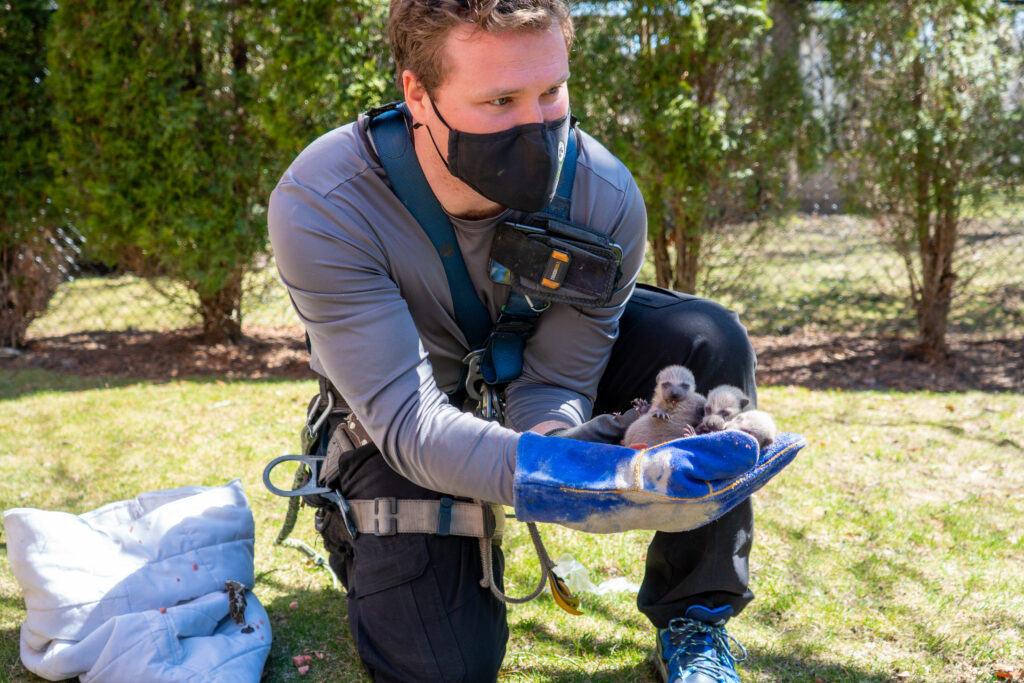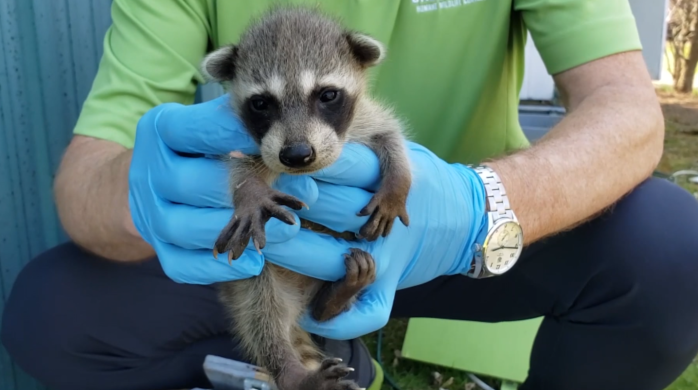Waking up to the unsettling sound of rummaging through your garbage cans can be truly frustrating. As you cautiously peek out the window, you’re met with the piercing gaze of a furry bandit – a raccoon. These nocturnal visitors may seem harmless, but a raccoon infestation could lead to numerous unforeseen difficulties.
In this article, our mission is to equip you with an in-depth understanding of raccoon behaviors. More importantly, we aim to offer solutions on how to coexist peacefully with these creatures without risking an infestation. Following a deep dive into raccoon behaviors, the blog will propose strategies to understand these creatures better, enabling you to sidestep an unwanted invasion preemptively. We will then discuss the potential dangers of a raccoon infestation.
Knowledge is power – Understanding raccoon behaviors is the first crucial step to preventing an infestation.
This is where our expert Skedaddle wildlife control team can help to address your wildlife-related concerns. Plus, we will provide insights as to how you can request a quote and learn more about our services.
Ready to embark on this enlightening journey? Let’s dive in and educate ourselves to live respectfully alongside our furry neighbors without crossing paths uncomfortably.
What are the Common Behaviors of Raccoons that Homeowners Should Be Aware Of?
Raccoons are nocturnal creatures known for their distinctive black masks and ringed tails. They are incredibly adaptable and capable of surviving in urban and suburban environments, causing a nuisance for homeowners. Let’s detail some raccoon behaviors:
- Foraging for Food: Raccoons are omnivores and more likely to enter your property while searching for accessible food sources. Anything from bird feeders, pet food, open trash bins, or your garden can attract them. Apart from deterring raccoons by managing these potential food sources, it’s also crucial to acknowledge their uncanny adaptability, which can make them persistent visitors despite your best efforts.
- Denning: Raccoons prefer to build dens in isolated and warm areas, like attics, chimneys, under decks, or sheds. They might seek entry into your house, especially if a female is ready to give birth. Understanding this behavior and securing potential denning sites can greatly reduce the chance of a raccoon infestation in your home.
- Activity at Night: As nocturnal creatures, raccoons are most active during the night. You might notice strange noises, such as scratching, chirping, or rustling, which could indicate their presence. Being aware of these sounds can help inform you of a potential raccoon infestation early, allowing you to take steps to prevent it from escalating.
What are the Signs of a Potential Raccoon Infestation?
Identifying the signs of a potential raccoon infestation is the primary step in preventive action. Raccoons are intelligent and curious animals that possess remarkable problem-solving abilities, which makes them proficient at invading residential spaces. Here are a few key indicators to look out for:
- Foraging Signs: Raccoons are omnivores. Evidence of them overturning trash cans, digging through compost piles, or even eaten bird feed can be indicative of their presence.
- Damage to Property: Raccoons can cause noticeable damage when they decide to make a home in or around your property. You might notice broken vents, scratches on walls or trees, or torn shingles on your roof.
- Noises: Raccoons are most active during the night. Therefore, hearing noises from your attic, walls, or crawlspace in the late hours could suggest a raccoon in the house.
- Raccoon Tracks and Droppings: Raccoons have a distinctive track with five toes, resembling a small human handprint but with long claws. Seeing these tracks and their unique droppings can be a major sign of an infestation.
These early signs are crucial in preventing a full-blown infestation. Once you suspect you may have a raccoon problem, taking necessary actions is essential. Immediate raccoon removal and wildlife control actions can avoid further complications.
What Potential Dangers Can a Raccoon Infestation Pose to Homeowners?
Raccoon infestations can pose serious risks to homeowners, their property, and their health. Recognizing these dangers is integral to effective wildlife control.
- Property Damage: Raccoons are notorious for causing extensive damage to homes. Their natural curiosity and sharp claws make them proficient at ripping apart soffits, ductwork, insulation, and roofs to gain access to warm and safe nesting areas.
- Diseases: Raccoons can carry a variety of diseases, including rabies, distemper, and parasites like fleas and ticks. Their feces can also contain harmful bacteria and parasites, such as roundworms. Direct contact is not always necessary as some of these diseases can be airborne.
- Aggressive Behavior: While usually non-confrontational, raccoons can exhibit aggressive behavior, particularly when cornered or protecting their young. Their claws and teeth can be exceptionally dangerous if they feel threatened.
Given the extensive damage and health risks raccoons pose, raccoon removal should only be handled by experienced professionals. Protecting your home from a ‘raccoon in the house’ situation is not a task to be taken lightly. Raccoon removal is a complex process that necessitates a deep understanding of raccoon behaviors and safe removal practices to avoid further damage and ensure the safety of all involved.
Skedaddle Humane Wildlife Control prioritizes humanely removing wildlife, including comprehensive clean-up and preventative measures. We’re here to ensure your home remains secure, your family is safe, and local wildlife is treated with respect and care. Do not hesitate to reach out to us for your raccoon removal needs.

How Can Understanding Raccoon Behaviors Help Prevent an Infestation?
Raccoons, with their distinctive bandit-like appearance, are intelligent and adaptable creatures. Knowing their behaviors will allow you to handle any encounter with these nocturnal animals better and avoid a pesky raccoon infestation. Let’s dive into some critical raccoon behaviors that might tip you off to their presence.
Food Seeking Behavior: Just like humans, raccoons are omnivores and have a wide variety of dietary preferences. Hence, they are attracted to garbage or compost bins, pet food, bird feeders, and fruit-bearing trees in your garden. Clustered trash or scattered garden vegetables are signs of their night-time feasting.
Mating and Nesting Behavior: Spring is the prime breeding time for raccoons, during which the females search for safe, warm places to give birth and rear their young. Attics, chimneys, garages, and under decks are ideal nesting sites for them. Noise, particularly at night, damage to soffit or roof vents, and sighting raccoon babies are strong indicators of a nest in your house.
Defensive Behavior: Raccoons are generally not aggressive unless threatened. If cornered, the raccoon might hiss, growl, or even attack to protect itself or its young ones. Always maintain a safe distance and contact a professional wildlife control service for safe removal.
Strong preventative measures are crucial to avoid unwelcome raccoon visitations or infestations. The first step is to secure easy food sources like garbage cans, pet food, or bird feeders. Seal possible entry points to your home with heavy-duty materials. Prune tree branches near your house that might serve as a runway for raccoons. If you suspect a raccoon infestation, never try to remove them on your own. It’s best to contact professionals who specialize in raccoon prevention and removal.
The Essential Role of Professional Wildlife Control Services
Handling a raccoon infestation can often be complex. Their intelligence level and problem-solving skills can sometimes outmatch common household remedies and prevention strategies. This is where we come into play we provide a comprehensive approach to a potential infestation:
- Assess and Remove: Should you have a raccoon problem, we conduct a thorough property inspection and use safe, humane removal methods.
- Clear and Clean: After removal, all areas affected by the raccoon infestation are cleared and cleaned, ensuring all potential health risks are eradicated.
- Prevent and Protect: Our services go beyond mere removal. We also focus on preventing any future infestations by sealing potential entry points and providing homeowner education for ongoing prevention.
Therefore, understanding raccoon behaviors and signs of infestation can make all the difference. Having the professionals handle these events ensures your home stays safe, healthy, and raccoon-free.
How Can Our Professional Wildlife Control Services Help?
The ideal way to remove raccoons and prevent future infestations is by seeking the help of a professional wildlife control service. And we provide exactly this service with our three-step procedure: access and remove, clear and clean, and prevent and protect.
In the first step, we safely and humanely remove any raccoons from your property. Then, we clear the area of any mess and thoroughly clean it to avoid attracting other wildlife. Finally, we establish preventive measures to protect your property from future infestations, which could include sealing entry points and offering advice on how to make your property less attractive to raccoons.
Preventing a raccoon infestation may seem like an intimidating task, but it doesn’t have to be. With the right knowledge and the help of our experienced wildlife control technicians, you can take measures to ensure your home stays raccoon-free. In conclusion, we at Skedaddle Humane Wildlife Control in Eden Prairie are the right company for the job. Contact us to request a quote and to learn more about our services.



